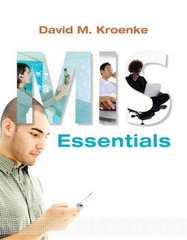Question
Question 1. The process of exercising influence through special skills or resources that meet the needs of other people is: a.formal leadership. b.situational leadership. c.informal
Question 1. The process of exercising influence through special skills or resources that meet the needs of other people is:
a.formal leadership.
b.situational leadership.
c.informal leadership.
d.participative leadership.
Question 2
The Australian division of Heap Engineering has decided to recruit a pool of new managers from the Australian Defence Force. A potential problem with this recruitment strategy is:
a.distinct subcultures may develop.
b.no culture develops.
c.the division is unprofitable.
d.local adaptation is limited.
Question 3
Henry, the new Managing Director of Heap Engineering and his executive team attempt to replace existing remuneration arrangements with new ones more in keeping with contemporary demands on the organisation. As a result his employees have gone on strike. Henry's action has apparently led to the establishment of a(n):
Select one:
a.counterculture.
b.oblique culture.
c.corporate culture.
d.hidden culture.
Question 4
In many Japanese companies, workers start each day by singing the company song. This is an example of a:
a.symbol.
b.myth.
c.ritual.
d.saga.
Question 5
Marc tends to think about his co-workers in terms of how they can help him and feels angry when projects do not go well. It is most likely that Marc
a.is high power.
b.is low power.
c.is low in interdependence.
d.is low in centrality.
Question 6
What are the three guidelines for enhancing personal power?
a.Coercion, effort and influence
b.Referent power, knowledge/information and effort
c.Personal attractiveness, expert power and coercion
d.Personal attractiveness, knowledge/information and effort
Question 7
The three phases of change are:
a.unfreezing, refreezing and evaluating.
b.unfreezing, changing and refreezing.
c.planning, implementing and evaluating.
d.unfreezing, modifying and refreezing.
Question 8
When it comes to managing organisational culture, good top managers:
a.are able to reinforce and support an existing strong culture.
b.find it difficult to change 'the way we do things around here'.
c.are more likely to revert to the status quo.
d.are more likely to change shared values.
Clear my choice
Question 9
Sue is the CEO of a marketing firm. She decides to ignore weak scientific evidence that a new food additive will increase cancer risks. She tells John, the Marketing manager, that the evidence is not inconsistent with their new marketing campaign for Oat Health Cereal and that she expects him to continue with the campaign. John proceeds with the campaign. Which source of power does Sue have?
a.Ethical
b.Referent
c.Coercive
d.Legitimate
Question 10
A new tracking system was implemented at Roadworks. Workers, however, avoided using it because it looked so complicated, though in actuality, the new system was easier than the former. As a manager of these workers, what would you do to best minimise this source of resistance at this stage?
a.Clarify intentions and methods
b.Delay change and wait a better time
c.Offer information and encouragement
d.Make sure that everyone is using the new system
Step by Step Solution
There are 3 Steps involved in it
Step: 1

Get Instant Access to Expert-Tailored Solutions
See step-by-step solutions with expert insights and AI powered tools for academic success
Step: 2

Step: 3

Ace Your Homework with AI
Get the answers you need in no time with our AI-driven, step-by-step assistance
Get Started


